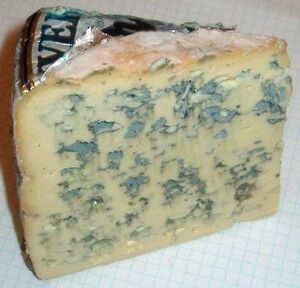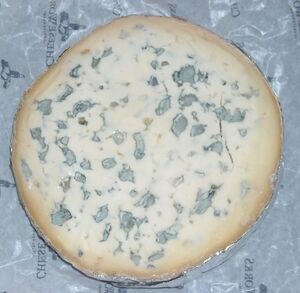Bleu d'Auvergne cheese


Bleu d'Auvergne is an AOP French blue cheese, named for its place of origin in the Auvergne region of south-central France. It is made from cows' milk, and is one of the cheeses granted the Appellation d'Origine Contrôlée from the French government.
Origins and preparation
Bleu d'Auvergne is of relatively recent origin, discovered in the mid-1850s by a French cheesemaker named Antoine Roussel. Roussel noted that the occurrence of blue molds on his curd resulted in an agreeable taste, and conducted experiments to determine how such veining could be induced. After several failed tests, Roussel discovered that the application of rye bread mold effectively created the veining, and that pricking the curd with a needle, by providing for increased aeration, could allow the mold to enter and encourage its growth. His discovery and techniques then quickly spread throughout the region.
Today, bleu d'Auvergne is prepared via mechanical needling processes. It is then aged for approximately four weeks in cool, wet cellars before distribution, a relatively short period for blue cheeses.
Properties and uses
Bleu d'Auvergne has a strong and pungent taste, but to a lesser extent than other blue cheeses; it is less salted, with a creamier and more buttery taste and a moister texture. Some recipes also use a weaker form of mold, Penicillium glaucum, to create the blue veins, rather than the Penicillium roqueforti used in Roquefort and other blue cheeses.
Bleu d'Auvergne is often used in salad dressings and pasta seasonings, and also it is a good cheese for snacking. Sweet wines such as riesling and sauvignon blanc or strong, robust red wines are commonly recommended to accompany it.
Calories in different varieties and various types of cheeses
The number of calories in various types of cheese is very similar when you compare your cheese to a similar types of cheese.
For example, almost cheeses that are similar to Cheddar cheese have around 400 calories per 100g
If the Bleu d'Auvergne cheese is not listed below, select a similar type of cheese from the list below to get a rough idea for the number of calories in Bleu d'Auvergne cheese.
The calorie lists are sortable by clicking the up and down arrows in the heading columns
| Cheese type | Calories per 100g |
|---|---|
| American cheese | 371 |
| Blue cheese | 353 |
| Camembert cheese | 299 |
| Cheddar cheese | 402 |
| Cottage cheese | 98 |
| Edam cheese | 357 |
| Farmer's cheese | 98 |
| Feta cheese | 264 |
| Fontina cheese | 389 |
| Goat cheese | 364 |
| Gouda cheese | 356 |
| Gruyere cheese | 413 |
| Mozzarella cheese | 280 |
| Parmesan cheese | 431 |
| Pimento cheese | 375 |
| Provolone cheese | 352 |
| Queso blanco cheese | 310 |
| Ricotta cheese | 174 |
| Roquefort cheese | 369 |
| Swiss cheese | 380 |
Discover Cookipedia's Culinary Creations on Pinterest
Explore the vibrant world of Cookipedia through our Pinterest page! We've curated a stunning collection of recipes that highlight the beauty of home-cooked dishes. It's the perfect way to visually navigate our extensive recipe library and get inspired by the flavours we’ve shared over the years. Dive in and discover your next favorite meal—one picture at a time!
Errors and omissions
If you are a cheese producer and your cheese does not appear to be listed on Cookipedia or the information on your cheese is incorrect or out of date, please use the Contact the Editor page to send us a message and we will update the information on your cheese.
#bleudauvergnecheese #auvergnecheeses #rye #cheeses #bluecheeses #saladdressings #cowsmilkcheeses #dairyproducts #cowsmilk #pasta #roquefort